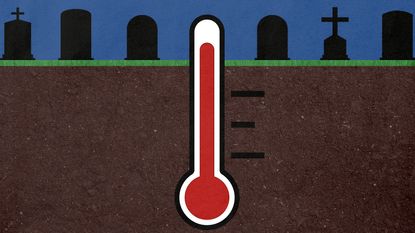What's really at stake with Biden's climate agenda
Millions of lives


Washington, D.C., is waiting to see if our broken political system can produce any climate policy as part of President Biden's agenda, but the stakes of the issue tend to get lost in horse race-obsessed political news coverage. "Winner: Manchin; Loser: Environmentalists" blares Politico Playbook (presented by Google), in an issue written by Rachel Bade, Eli Okun, and Garrett Ross. "The entire climate agenda of the Biden administration is in question right now thanks to one man — and it's unclear if this dynamic will change," they write.
So let's be clear about one of the biggest climate policy stakes: the literal lives of millions and millions of human beings.
One way to unplug from the Playbook mindset is to simply punch some key words into your favorite search engine. Did you notice the unusual flooding in Venice recently? Or London? Or how about the torrential rains and mudslides in India that have killed a reported 150 people at time of writing? How about flooding in Thailand?
Subscribe to The Week
Escape your echo chamber. Get the facts behind the news, plus analysis from multiple perspectives.

Sign up for The Week's Free Newsletters
From our morning news briefing to a weekly Good News Newsletter, get the best of The Week delivered directly to your inbox.
From our morning news briefing to a weekly Good News Newsletter, get the best of The Week delivered directly to your inbox.
Did you notice that scientists recently estimated California just had its driest year in a century? Have you seen that Lake Mead — the largest reservoir in the country — is at its lowest level since 1937, when it was first filled? How about the unusual "atmospheric river" that is predicted to strike northern California in the next few days, likely causing tremendous rainfall and thence mudslides thanks to the constant plague of climate change-fueled wildfires that have burned up stabilizing undergrowth? (Though that probably won't bring enough precipitation to end the drought.)
The savvy beltway media is certainly not paying close attention to any of those things.
Another more empirically rigorous way to understand the stakes is by consulting a recent report from The Lancet, in which dozens of doctors and research scientists summed up the threat climate change poses to health around the world. Among other things, they find that in 2020: high temperatures caused people over 65 to suffer 3.1 billion more person-days of exposure to heatwaves as compared to the 1986-2005 baseline; that the spectacularly extreme heatwave in the Pacific Northwest killed hundreds of people; that a record of 295 billion work-hours were lost to extreme heat; and that each month up to 19 percent of the Earth's land surface suffered extreme drought, as compared to a record of 13 percent between 1950 and 1999.
They find that last year, drought and heat cut crop yields of staple crops compared to the 1981-2010 baseline — corn by 6.0 percent, winter wheat by 3.0 percent, soybeans by 5.4 percent, and rice by 1.8 percent; that the area of the globe suitable for transmission of malaria, dengue fever, Zika virus, chikungunya virus, and cholera is increasing rapidly; and that very few countries are taking this health threat seriously.
Few countries are doing anything close to their part to cut greenhouse gas emissions, either. On the contrary, "Of the 84 countries reviewed, 65 were still providing an overall subsidy to fossil fuels in 2018 and, in many cases, subsidies were equivalent to substantial proportions of the national health budget," the authors write.
Here is a factual statement: political elites that cut down climate policy, as Sen. Joe Manchin is trying to do, or block it altogether, as the entire Republican Party is trying to do, are taking actions which, if successful, will directly cause the deaths of many, many people. More heatwaves, more extreme drought and flooding, more powerful hurricanes, rising sea levels, less food — these are things that kill people. It's already happening all the time — a few hundred here, a few thousand there. Without aggressive and united action across the world to cut greenhouse emissions and defend against the damages that are already baked in, those numbers will reach into the millions in not too long. And for every person that dies, there are dozens more who will be sickened, or lose their homes or livelihood, or all three at once.
It's far from the first time that carbon pollution has killed people. A recent study estimated that in 2018, fine particulate matter pollution alone (that is, particles under 2.5 microns in diameter) resulting from fossil fuel combustion caused the deaths of 8.7 million people — or about a fifth of all deaths.
The fact that savvy beltway reporters cover climate policy like it's a pet rock for a daffy special interest group at best — indeed, as Talking Points Memo's Josh Marshall writes, Politico, Punchbowl, and Axios in particular "have become what amounts to a cheering section for" Manchin and his ally Kyrsten Sinema — reveals the utter rotten emptiness at the core of their faux-sophisticated view of politics. It's not cynical realism to cause millions of deaths and terrific damage to America's own infrastucture in service of a few more years of carbon profits. It's moral corruption so deep as to be tantamount to murder.
Sign up for Today's Best Articles in your inbox
A free daily email with the biggest news stories of the day – and the best features from TheWeek.com
Ryan Cooper is a national correspondent at TheWeek.com. His work has appeared in the Washington Monthly, The New Republic, and the Washington Post.
-
 Why India's medical schools are running low on bodies
Why India's medical schools are running low on bodiesUnder The Radar A shortage of cadavers to train on is forcing institutions to go digital
By Chas Newkey-Burden, The Week UK Published
-
 Magazine solutions - November 22, 2024
Magazine solutions - November 22, 2024Puzzles and Quizzes Issue - November 22, 2024
By The Week US Published
-
 Magazine printables - November 22, 2024
Magazine printables - November 22, 2024Puzzles and Quizzes Issue - November 22, 2024
By The Week US Published
-
 Has the Taliban banned women from speaking?
Has the Taliban banned women from speaking?Today's Big Question 'Rambling' message about 'bizarre' restriction joins series of recent decrees that amount to silencing of Afghanistan's women
By Harriet Marsden, The Week UK Published
-
 Cuba's energy crisis
Cuba's energy crisisThe Explainer Already beset by a host of issues, the island nation is struggling with nationwide blackouts
By Rebekah Evans, The Week UK Published
-
 Putin's fixation with shamans
Putin's fixation with shamansUnder the Radar Secretive Russian leader, said to be fascinated with occult and pagan rituals, allegedly asked for blessing over nuclear weapons
By Harriet Marsden, The Week UK Published
-
 Chimpanzees are dying of human diseases
Chimpanzees are dying of human diseasesUnder the radar Great apes are vulnerable to human pathogens thanks to genetic similarity, increased contact and no immunity
By Harriet Marsden, The Week UK Published
-
 Deaths of Jesse Baird and Luke Davies hang over Sydney's Mardi Gras
Deaths of Jesse Baird and Luke Davies hang over Sydney's Mardi GrasThe Explainer Police officer, the former partner of TV presenter victim, charged with two counts of murder after turning himself in
By Austin Chen, The Week UK Published
-
 Quiz of The Week: 24 February - 1 March
Quiz of The Week: 24 February - 1 MarchPuzzles and Quizzes Have you been paying attention to The Week's news?
By Sorcha Bradley, The Week UK Published
-
 Will mounting discontent affect Iran election?
Will mounting discontent affect Iran election?Today's Big Question Low turnout is expected in poll seen as crucial test for Tehran's leadership
By Sorcha Bradley, The Week UK Published
-
 Sweden clears final NATO hurdle with Hungary vote
Sweden clears final NATO hurdle with Hungary voteSpeed Read Hungary's parliament overwhelmingly approved Sweden's accession to NATO
By Peter Weber, The Week US Published